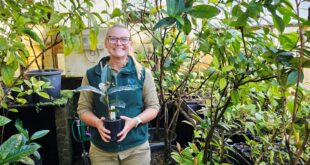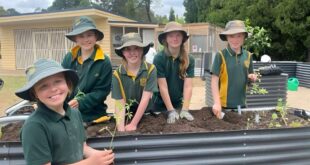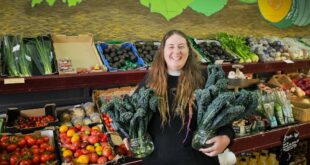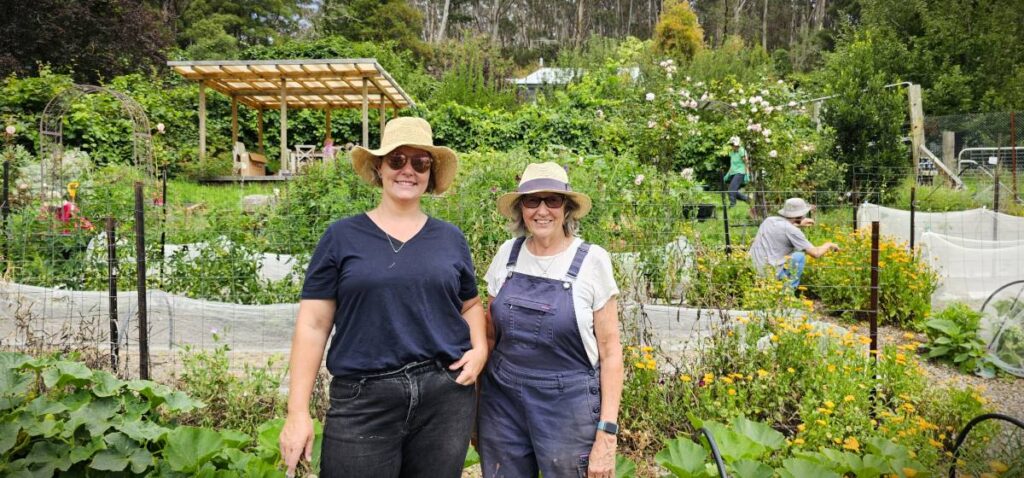
Hillier Windsor and Lyndall Crompton at Cliff View Farm on Shipley Plateau, Blackheath
Story and photos by Hamish Dunlop
Take a tour of the community gardens and farms in Blackheath and you’ll find alpacas, companion flowers, compost to die for, hundred-year-old ‘Shipley’ apple trees, native bees, friendly faces, wonky tomatoes, life philosophies and much, much more.
Key Points:
- Three community gardens and farms in Blackheath are making it an ‘Incredible Edible’ place to live.
- The gardens feed the community and support the spread of acclimatised seed.
- They also create environments for people to socialise, learn and get their hands in the dirt.
Cliff View Community Farm
Lyndall Crompton, the manager of Cliff View Community Farm, has given me excellent instructions. “Stay on Shipley Road. Go past the old RFS shed and after the metal plates on the road take the gate on the right.” I arrive early and hold the gate open for Lyndall to drive in. “Hamish?” she asks with a smile. She parks and asks where I’d like to start.
The garden is bursting with life. Annual and perennial beds run up the hill, interspersed with salvias and purple-flowering catmint. Among the beds is a growing frame-shaped sculpture made of dead Eucalypt branches and a metal archway with fragrant roses.
Fennel is going to seed and dead artichoke heads are ready for the chop. “We have a lot of flowers to feed the bees,” Lydall says pointing to the beehives in an adjoining paddock. “The hoverflies love the fennel and we’ve got comfrey up there: good for pollinators and compost.”
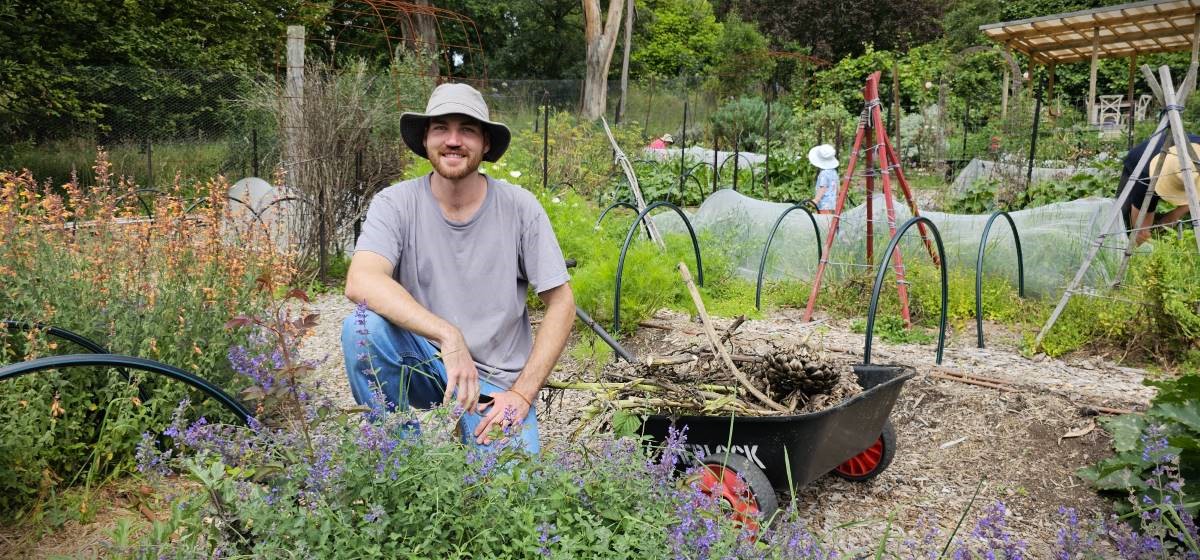
Volunteer Leo Dalton at work, with other volunteers and one of Hillier’s twins in the background.
Lyndall points out potatoes, pumpkins, and carrots as we pass the walk-in poly tunnel used for germination and seedling growth. “Carrots are one of my favourite crops!’ she says. A bit tricky to get going. If the seeds dry out too much they just don’t germinate.”
The carrots and other crops are covered with a fine netting and shade cloth can be pulled over the top if the sun is too intense. “The mesh keeps out some of the larger animals,” she says. “The wood ducks and the bower birds. It helps with the harlequin beetles too.”
What community gardens give
Cliff View’s focus is food production. 95% of what is harvested goes to Blackheath Area Neighbourhood Centre. Since July, 170kg of food has been donated. Last year it was around 350kg and 400kg the year before that. Lyndall provides 5 to 6 vegetable boxes on a fortnightly basis.
When there is a glut of vegetables, she takes a specific crop such as cucumber in to BANC. Volunteers take some too. Sometimes crops go to the Salvos in Katoomba who also put together food hampers.
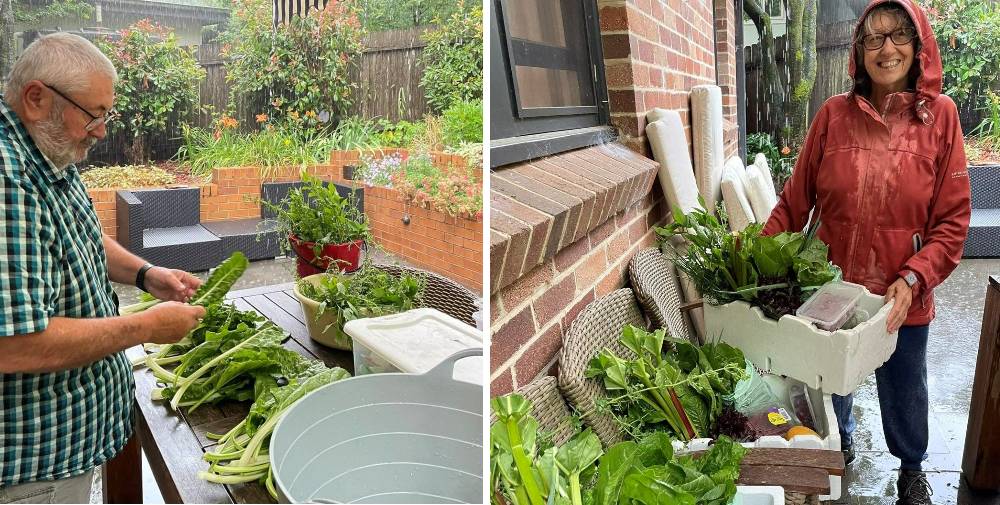
Lyndall and her husband Jeffrery Crompton preparing the last hampers for 2023. (Images supplied)
Lyndall says people, including her and the volunteers, all benefit from the social element. Everyone gets on with things and at the end they sit under the pagoda above the garden and sip tea and chat.
“There’s a whole education component too,” Lyndall says. “I learned a lot from Lis at the Blackheath Community Farm when I first started volunteering. Margaret who is weeding down there owned a farm and Karen is really into orchards. A guy came and did a propagating workshop which is where I learned how to propagate apple branches off the trees using air layering.”
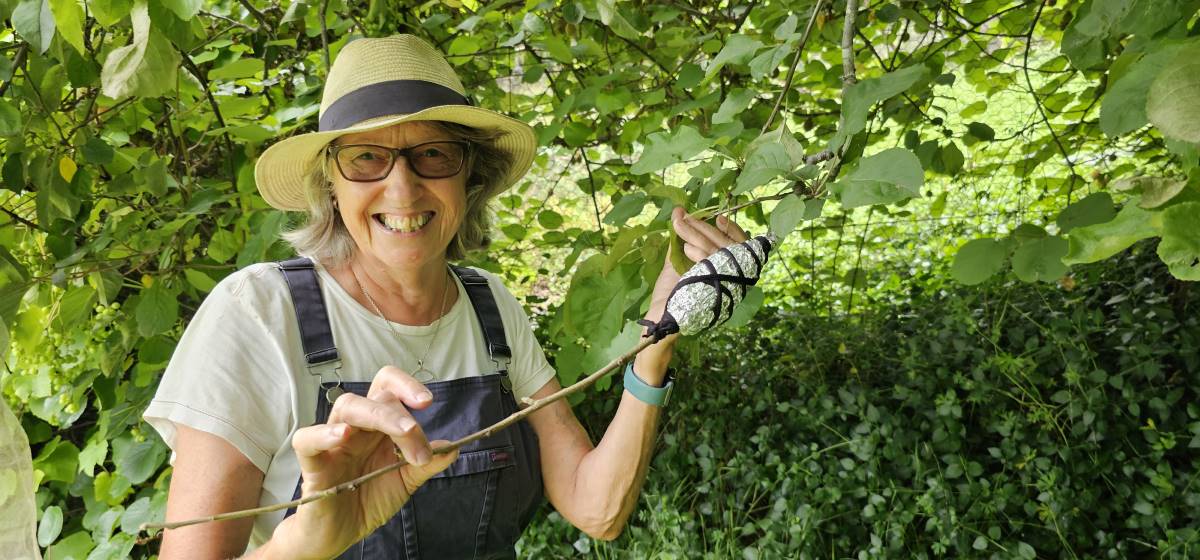
Lyndall with an ‘air layered’ branch on its way to becoming a new tree.
The earth also benefits. Cliff View is a no dig garden. Cardboard goes down to suppress the weeds and compost goes on top. The plants go in and sugar cane mulch is spread around to reduce moisture loss.
A grant from Susan Templeman’s office paid for a new rotational composting system. Green and brown material is successively turned into the next bin until it becomes rich and ready. This will enable the farm to be soil self-sufficient.
Green material comes from the garden and carbon comes from mucking out the goose and alpaca poo. Water comes from a solar-pumped dam fed by an underground spring.

The new composting bays.
Regenerative farming practices are important.
“We’re an organic farm here. We don’t use any chemicals to manage the weeds like many commercial farms do, including no dig operations. The weeds protect the soil until we want to plant something. The idea is that after you’ve harvested a crop, you haven’t depleted the soil. At the very least, the soil remains the same, or is left in better condition.”
Cliff View
Cliff View is owned by Roger Mackell who has a half share in Gleebooks. His daughter Hillier Windsor set up the garden in 2019 when her family lived in the small farmhouse above the garden. As Lyndall and I survey the gardens from amongst the pumpkins, Hillier arrives with her three-year-old twins. “Friends joked that I couldn’t just have a vegie patch, I had to have a vegie paddock!” Hillier says with gusto.

Garlic drying under cover.
“When I turn up and see big handfuls of people, and the garlic drying, and how idyllic it is… It’s so lovely to still have it being productive. Land to grow on is expensive and having space is a privilege,” she continues. “I did a permaculture course through Milkwood and I remember the concept of a fair share. Take what you need and share the rest.”
She tells me about her memories of coming up from Glebe as a child. “That’s where I developed an interest in growing. In winter we’d have soup. My dad and my uncle would be so proud that everything had come out of the garden, bar the wedges of parmesan on top.” Hellier says her father was excited for the land to continue to contribute to the community.
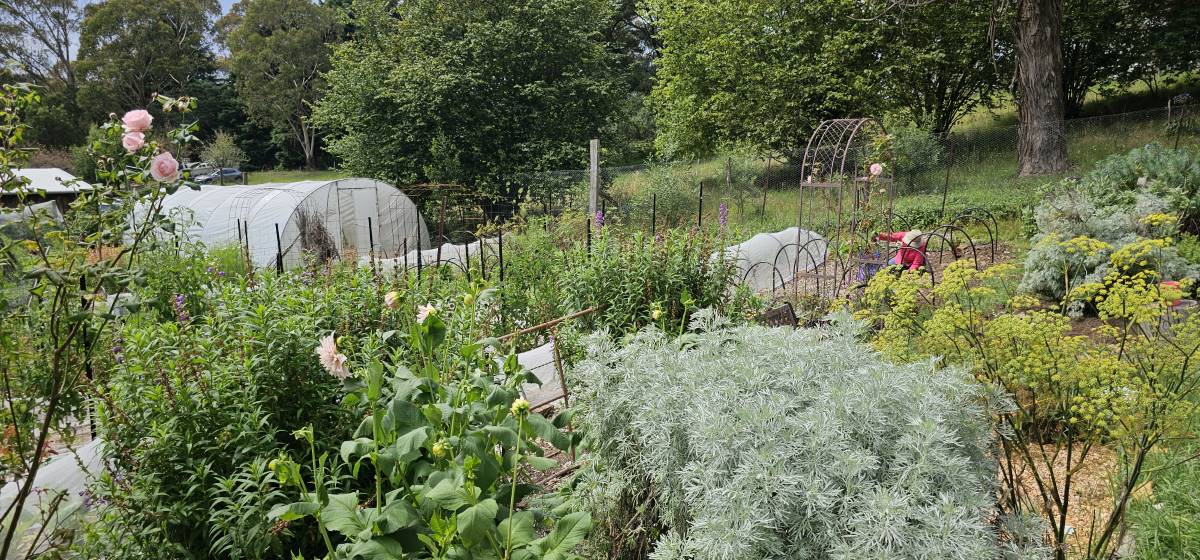
Gardens are a place to get a dose of ‘green time’.
There’s a natural pause in the conversation and the topic changes to mental health. “It’s just so good to come here and get down amongst the plants and soil,” Hillier says. “There’s research that suggests that just 10 minutes of ‘green time’ is enough to make a measurable difference. “Not just feeding the stomach, but feeding the soul,” Lyndall imparts. “There’s nothing like nurturing life and losing yourself in the garden to make for fairer weather.”
You can volunteer at Cliff View Community Farm on Thursday mornings from 9am. Follow the instructions at the beginning of the story. You can contact Cliff View via their Facebook page or Instagram.
Blackheath Community Kitchen Garden
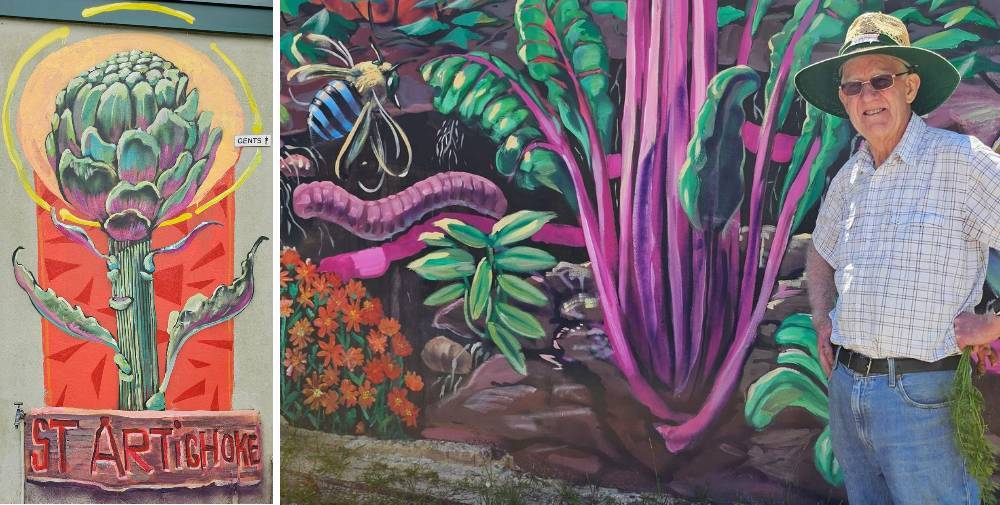
Murals at the Kitchen Garden painted by Alex Grilanc with community collaboration.
I’m finding my way around the Catholic Church in Blackheath and a woman calls out to ask me if I’m all right. “I’m looking for Brian!” I say with intent and she points me in the direction I’m travelling.
I find Brian in the garden, sporting a well-used Bunnings hat. He greets me with bright eyes and a generous gaze. “The garden might look unmanaged to the uninitiated,” Brian says. “There a few more weeds than I’d like, but we follow organic principles. The grasses and dandelions are good for the soil life and pollinators.
Like Cliff View, the garden is filled with flowers, fruit and vegetables. Bees meander between rich purple dahlias and yellow calendulas. The thyme is in flower too with its beautiful lilac hues. It’s a lovely colour palette.
At the edge of the garden there’s a herb patch filled with parsley, lemon balm and bright orange nasturtiums. “The leaves and flowers of the nasturtiums are good for salads,” Brian explains.
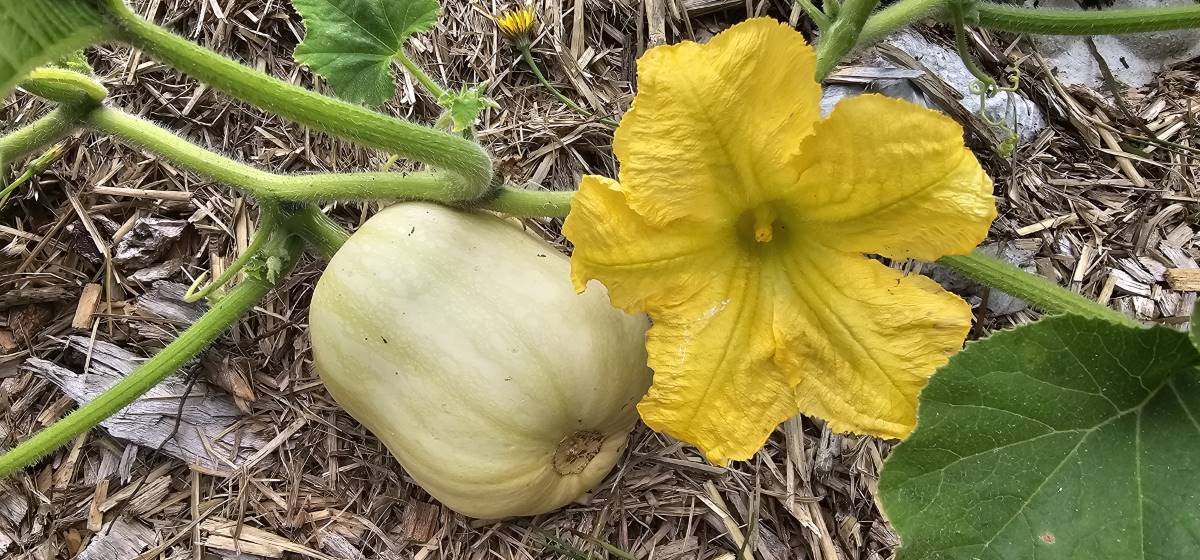
A butternut pumpkin nestled happily on top of pine mulch provided by local contractors.
The garden is food focused. The fresh produce goes into making soups. The Catholic Church and the Uniting Church run a weekly lunch. They both contribute soup and share the running of it. It’s held at 43 Govetts Leap Rd in Blackheath every Monday. “People often come earlier,” Brian says. “Around 10. There’s tea on hand and people sit around and chat. Sometimes there’s cake and biscuits.”
Brian also takes garden offerings to the Blackheath Area Neighbourhood Centre. Some of the people who attend a Vinnies community group at the church on Wednesday mornings benefit from the garden too. Brian says it’s a group that focuses on getting people out and about and in contact with fellow community members. He tells me the Parish meeting room is open to other community groups.
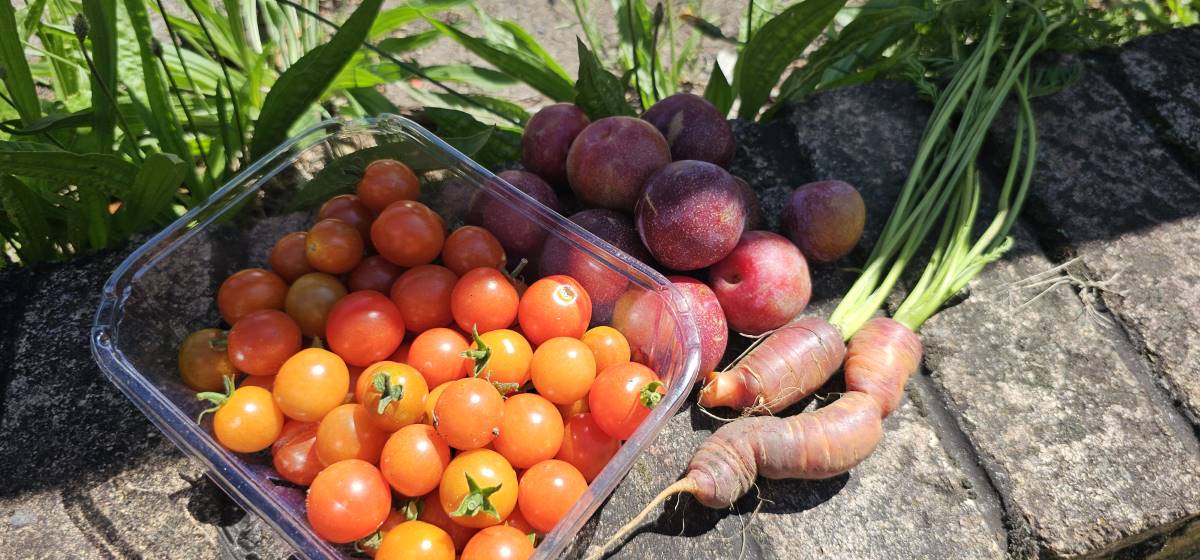
A quick pick! Produce from the garden being harvested.
A tasty collaboration
People come to volunteer on a Wednesday morning and every second Saturday. Special events include planting potatoes in spring and compost workshops. Brian has teamed up with Red Door Café in Leura for composting. The garden gets coffee grounds, vegetable scraps and eggshells. The eggshells are dried in the sun, broken up and sprinkled around new seedlings. “It’s a great way to stop slugs and snails,” Brian says.
The garden started composting with standard black bins, but the vegie scrapes and garden waste outstripped the available space. A series of parallel stalls were built using pallets from Todarello’s and some corrugated iron donated by the Uniting Church. The garden shed was build using this iron too.
The recycled wood used was secured by a parishioner from a local building site. Sawdust comes from a furniture maker in Lawson to introduce greatly needed carbon into the green material.
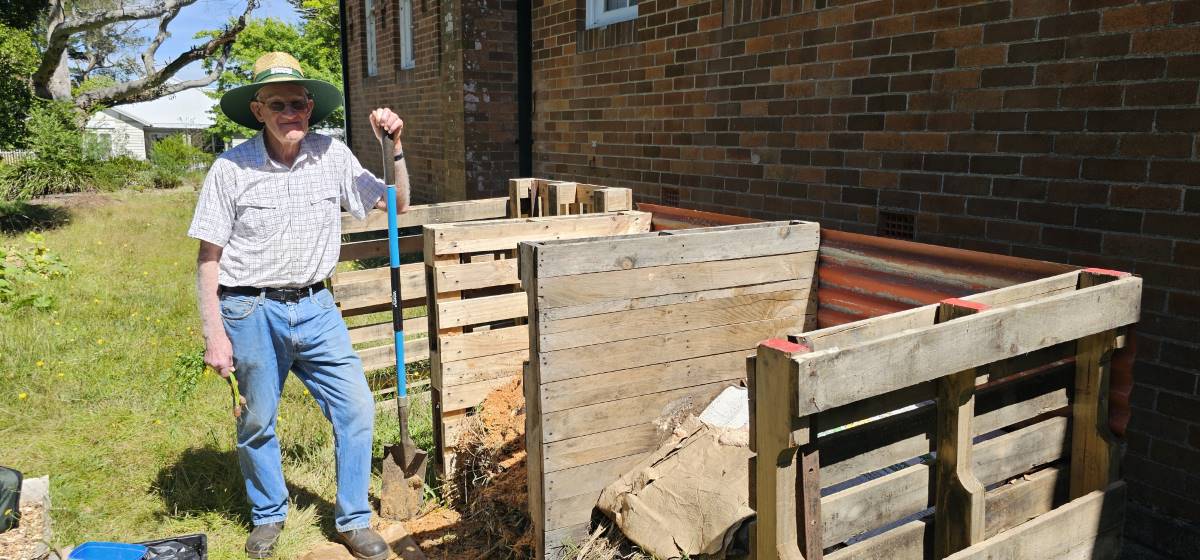
Brian Bright with compost bays made from recycled materials.
Seeds and Covid
The garden started with the planting of fruit trees during the COVID lockdowns. Netting bags hanging from some of the trees are weighted with fruit. Dying off plants that add to the wildness of the garden provide seeds that are propagated. Like the other community farms, Brian also gets seedlings from The Vegie Patch in Blackheath. “I haven’t met Mel yet,” Brian says, but someone from the Community Farm splits what Mel donates.”
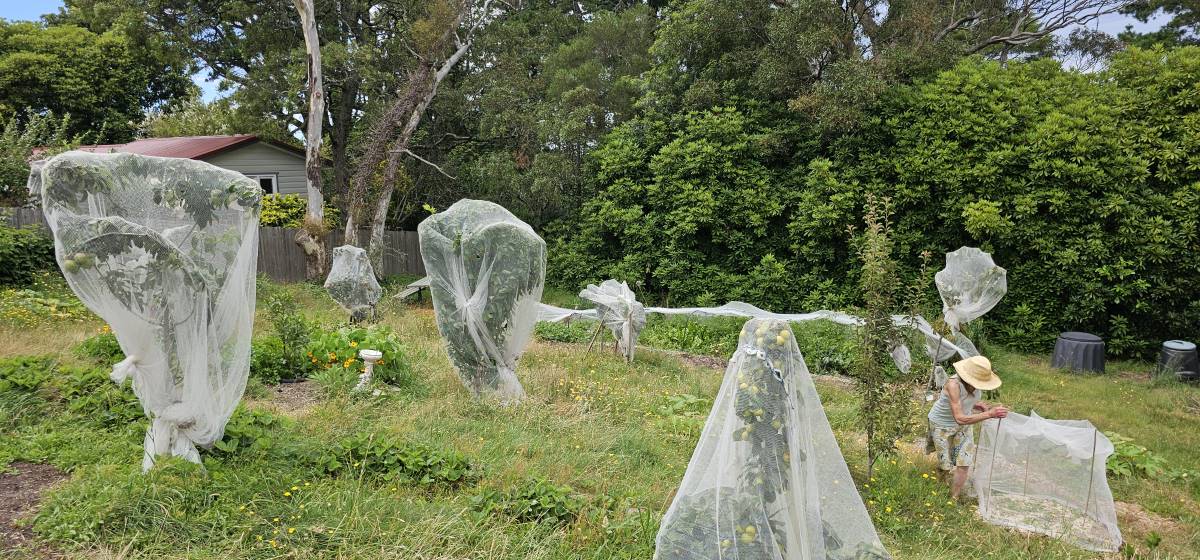
Fruit trees planted during COVID thick with fruit.
Feeding the world
Brian tells me the garden was in part inspired by the words of Pope Francis. “The Pope talks about the cry of the earth and the cry of the poor,” explains Brian. “What we’re doing here is a practical response to that. It’s a no dig garden, so the plants and all the creatures including the soil microbes have a home. It’s a place people can come to be with themselves and be with others too. The soup lunches are supported and people in need can access fresh produce. Like all the people-focused farms in Blackheath, we’re here to support the community.”
Blackheath Community Farm
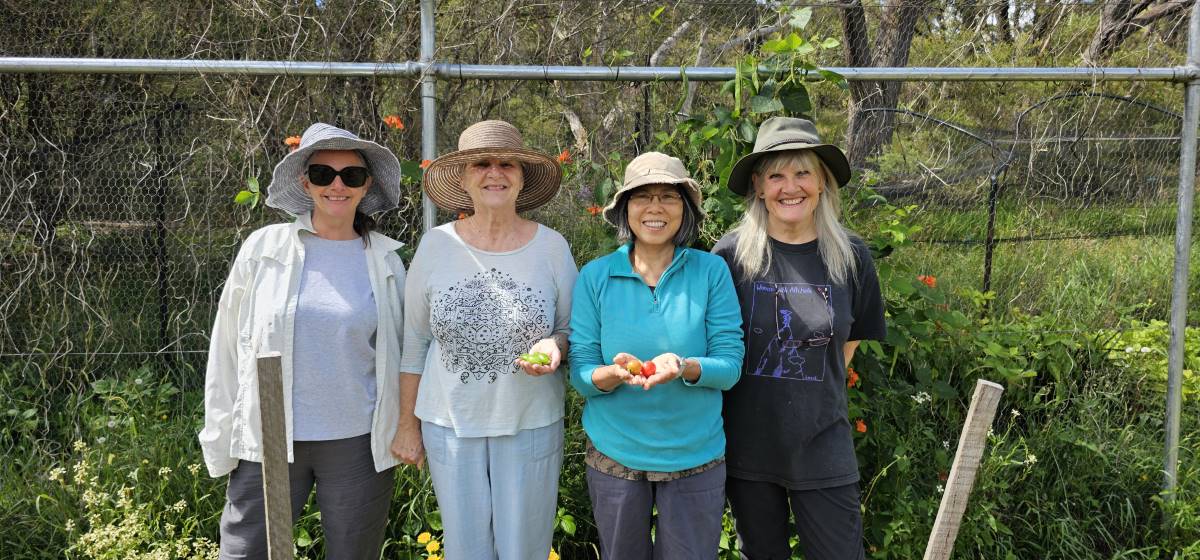
Blackheath Community Farm volunteers. L to R: Claire Lebanovits, Judith Wagner, Sasi Keosawang and Lis Bastian.
It’s a sunny Sunday morning and I’m rambling down a drive towards a collection of parked cars. Lis Bastian spots me through the raspberry tunnel and a burgeoning potato crop. “Hi Hamish!” she sings out.
This is my last stop on the Blackheath community farm and garden trail. It’s the end of the trail, but the beginning of the story. It was the first community farm in the village, aptly named the Blackheath Community Farm. It’s on land owned by Mountains Christian College. Lis ran a permaculture course at the College over seven years ago. This led to a proposal to use a portion of the grounds for a community farm and the College and community rallied to support the project.
Fried green tomatoes
When I step into the large wire-netted enclosure there is a hubbub of activity. A group of volunteers are standing around a thriving tomato plant. The exclamations and laughter centres on some conical looking fruit. Not your standard supermarket offering, but they have that pungency that reminds me of childhood time in the garden with Dad.
The ones that have come a cropper are collected and someone proposes a recipe for fried green tomatoes. Add caramelised onion, lashings of Worcestershire sauce, a little sugar and serve on fried eggs.
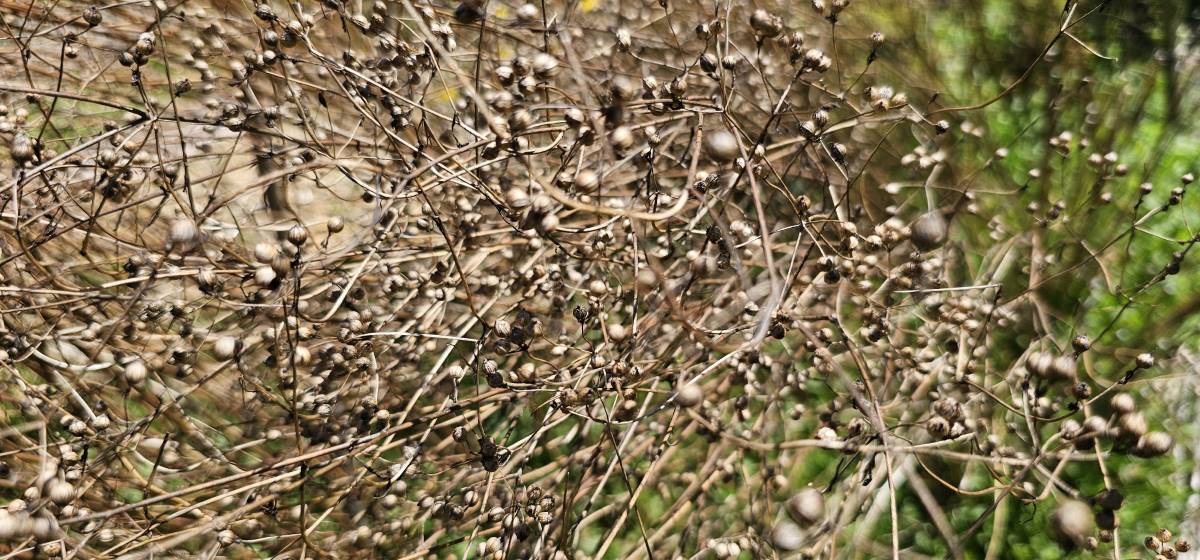
Coriander seeds ready for cooking and storing and reseeding.
This farm is a little different than Cliff View and the Community Kitchen Garden. Its mandate is to grow community first, then locally acclimatised seed and finally food.
Volunteers come on a Sunday between 10 and 1, but on blue-sky days, people hang around until 3. There’s always a communal lunch. People bring different dishes and Lis’s sourdough bread is broken.
Everyone does a walk round first and then people choose what they want to do. Gathering the week’s crop is always exciting. Recipes are swapped over lunch. Connections are made. Friendships developed. And those who simply want to be with the earth and its bounty are left to their quiet joy.
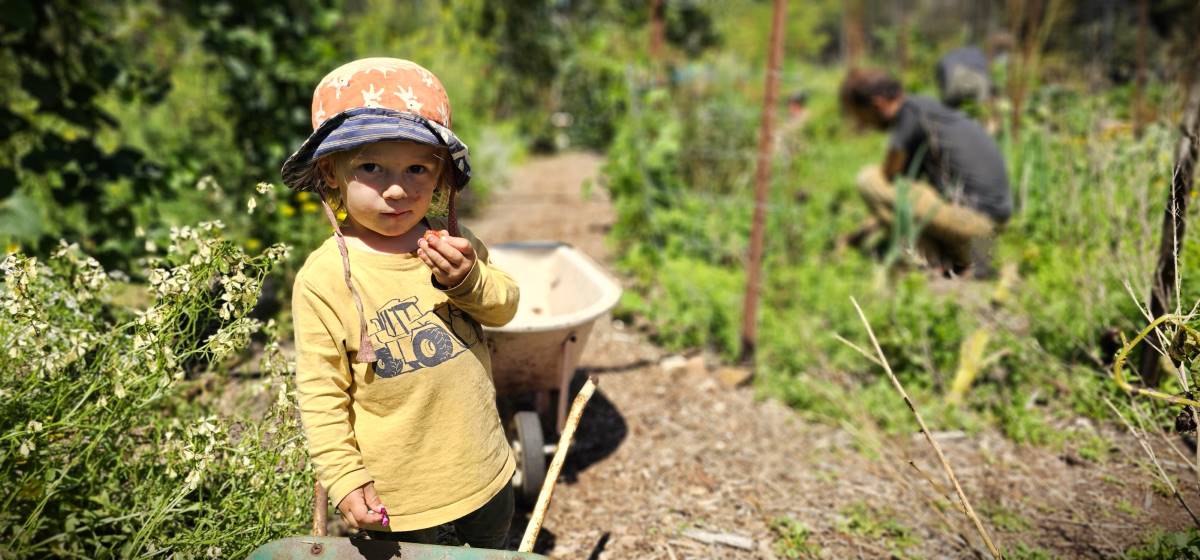
Ash on strawberry quality control, with dad Robin in the background.
Seeds
Lis tells me the Farm keeps seeds circulating. She says that collecting seeds is really important. If you find plants that grow well in the unique Mountains conditions, preserving those species starts with seeds.
In her early years in Blackheath, she started a micro business called Crazy Climate Seeds. The packets fittingly featured a cockroach with a pitchfork and the tagline “If they can grow in Blackheath they can grow anywhere”. The same pack has been adapted for Farm seeds which get sold at Open Days and Garlic Sale Days. People can obtain seeds too by contacting Lis directly. Plants that go to seed are left to do so. Seeds are collected, including some for cooking, like coriander.
“Some seeds, like the parsnip over there, only stay viable for 12 months,” Lis says. There is a lovely history here. The parsnips have been growing in the garden since its inception. They were given to Lis 25 years ago by Anne Jolliffe. Anne lived in Blackheath and was one of Australia’s first female animators. Notably, Anne worked on the Beatles’ Yellow Submarine animation. They are now fondly described as Anne’s parsnips.
Other plants, like the perennial scarlet runner beans, grow vigorously along the garden’s edge. They too are stalwarts of seasons gone by.
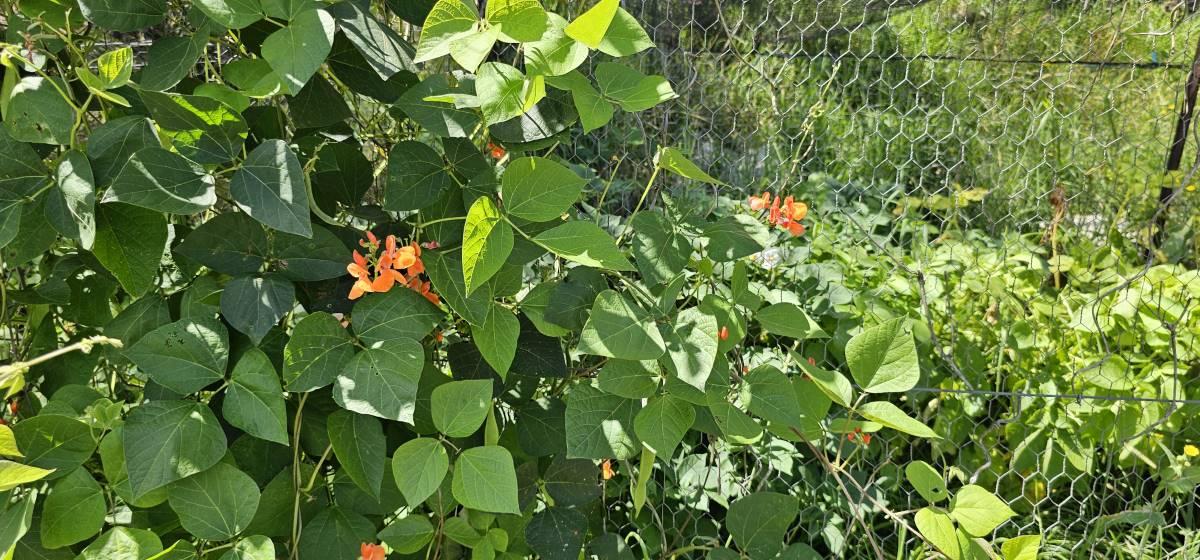
Scarlet runner beans with Mel’s potatoes flourishing behind the chicken wire.
Other people have contributed plants to the garden. Mel Michael who has recently taken over The Vegie Patch in Blackheath regularly donates seedlings. “All those different potatoes thriving along there are from Mel,” Lis says. “She’s so generous and has an eye out for community.” Vegetable scraps also come from Mel to feed the compost. Volunteers bring organic matter too and a woman who rescues rabbits brings carbon in the form of a poo/straw mixture.
The compost of life
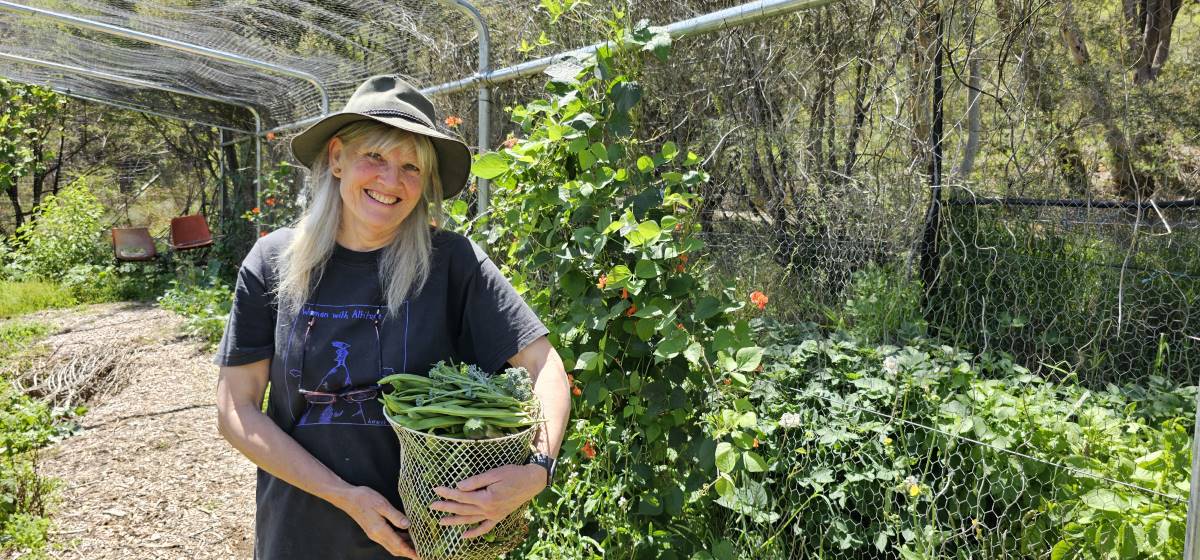
Lis Bastian with some of week’s vegetable harvest.
The Community Farm reflects one of two strong strands of Lis’s approach towards planetary health. “It’s hands in the dirt, meeting with lovely people, exercise, Vitamin D and building community. This is one way to be healthier yourself, and to start creating better, healthier systems,” she says.
“There’s a quote from a book called Braiding Sweetgrass,” she continues: “I dream of a time when the earth will give thanks for its people. The earth is amazing,” she says. “With so little care it still gives so much. With a little help, it’s bountiful. My focus is on everything that creates and supports life, rather than destroys it.”
In her role as Senior Lead for Blue Mountains City Council’s Planetary Health Initiative her second focus is on broader systemic change and includes the power of media and storytelling to change our culture, by sharing what people are doing in the world to make a difference. “Someone once told me, Whatever you do, spend your life peddling hope,” she expounds. “It’s about sharing news that’s also life-giving.”
“Since I learnt about climate change decades ago, doing something about it has been paramount. Doing things, even small things, matter to the planet. They have a huge impact on how you experience the world too. I want to live fully to the edges of my life every day. Death is inevitable, but our ‘job’ as an integral part of the natural world, is to live, and support life, with all our being while we can.”
Take Action:
- Help feed people in the community by volunteering at a community farm.
- Be part of community building by hanging out with people and plants.
- Enhance your mental health by getting some ‘green time’ in your diet.
Share this article:
This story has been produced as part of a Bioregional Collaboration for Planetary Health and is supported by the Disaster Risk Reduction Fund (DRRF). The DRRF is jointly funded by the Australian and New South Wales governments.
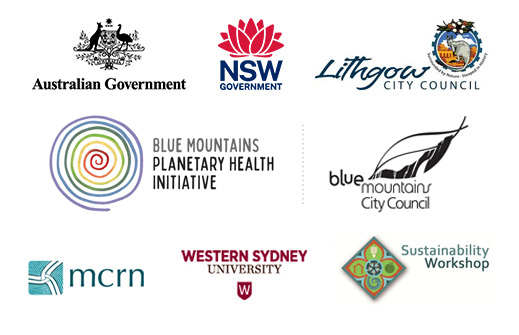
More from around the region
Yesterday we interviewed physicist Emeritus Professor Hans Coster at Middle Earth in Lithgow. He was in charge of the Sydney Chapter of the Club of Rome and we can`t wait to share with you everything we learnt when we visited him in the home he`s built into a hill in Lithgow. Subscribe to our newsletter via any of our news sites to make sure you get this story!
#nickelironbatteries #middleearth #planetaryhealth #hanscoster
Inspiring reading and a video of Harry Laing`s mesmerising performance of `Time of Fire` in the Blue Mountains Planetary Health newsletter (link in profile): https://bit.ly/3UyytbE
Subscribe to receive this fortnightly via any of our news sites:
Katoomba Area Local News: Fungi of the Upper Blue Mountains
Mid Mountains Local News: The Fun Guy: Earth Rising Mushroom Farm in Lawson
Blackheath Area Local News: A Carnival of Camellias: Beauty and Biodiversity at the Blue Mountains Botanic Garden
Springwood Area Local News: Springwood Lot Party: Transforming an Underused Space Into a Vibrant Community Event
Lower Mountains Local News: Women Helping Women to Survive and Thrive
Lithgow Local News: Fabulous Fungi in Lithgow & the Blue Mountains
@botanicsydney @zontaclubbluemountains
#fungi #fantasticfungi #camellias #zonta #camelliasinensis #springwood #harrylaing #timeoffire
With a bit of tweaking we can reduce how much we need to spend on water and energy. Blue Mountains libraries now stock free-to-borrow ‘My Energy and Water Saver’ kits that Blue Mountains residents can use to assess their homes for energy and water efficiency. Belle Butler borrowed one of the kits and discovered some room for improvement in her Lawson home. Read more in Mid Mountains Local News (link in profile) https://www.midmtnslocalnews.com/saving-power-with-take-home-kits/
@bluemountainscitycouncil
#energyefficiency #waterefficiency #savemoney #savetheearth #freeresource #librariesrock #takeaction #planetaryhealth
Blackheath Public School is providing hands-in-the-dirt lessons on how students can make their school more sustainable. From Crunch & Sip to Cluckingham Palace – literally! – organic waste makes the sunflowers shine and worms frolic in the fertile compost. Students will soon be eating spinach and cheese scrolls made by the canteen using garden produce, while parents report their children want to eat more vegetables. Read more in Blackheath Area Local News (link in profile): https://blackheathnews.com/sustainability-at-school/
blackheathpublic_pandc #blackheathpublicschool #blackeath #bluemountains #sustainableschools #schoolgardens #schoolgardensmatter #planetaryhealth
A fun day yesterday for @bluemountainsplanetaryhealth! In the morning we interviewed and filmed the young people in our Upcycling Fashion Skillshare program. They`re helping create the circular economy we need. In the afternoon we ran a workshop on media skills to help another group of young people learn how to create the news we need, and the news they want to see! They learnt how to use green screen and teleprompter technology as well as skills for interviewing and presenting the news. We`re looking forward to sharing the outcomes! Thank you @heli.jones @kalanigacon @kfmmedia #solutionsmedia #thenewsweneed #upcyclingfashion #planetaryhealth #skillshare #katoomba #bluemountains #pluriversity
Such a fabulous day working with a great bunch of young people to learn how news is made, how green screens work and how to create the news we all need to hear. We can`t wait to see the end result!
#solutionsmedia #thefixingnews #thenewsweneedtohear #greenscreens #mediaproduction #planetaryhealth #skillshare
For over 45 years the Springwood Neighbourhood Centre Co-operative has been providing much needed community resources, advice and facilities to the people of the Blue Mountains. Tonje Akerholt and the other staff at the Centre work tirelessly to ensure that the space continues as somewhere everyone can feel welcome and connected, and they offer a fascinating range of volunteer opportunities. Read more in Springwood Area Local News (link in profile):
https://springwoodlocalnews.com/springwood-neighbourhood-centre/
@centre2777 #springwoodneighbourhoodcentre #neighbourhoodcentre #communitycentres #springwood #bluemountains #communitytogether #planetaryhealth
As our ageing infrastructure begins to fail in the face of extreme weather events, the Blue Mountains Planetary Health Initiative is bringing together international experts to ’talk infrastructure` at 10am next Tuesday 23 April.
In 2016 Dr Penny Burns and a group of global asset managers created the Talking Infrastructure Association to focus on improving infrastructure decision making around the world, including developing tools and techniques to ensure that new infrastructure projects will survive the coming changes in technology, demand and climate change - that is, that they will be ‘future friendly’.
Next Tuesday, Ruth Wallsgrove from the UK, a board member of Talking Infrastructure, and a global leading Asset Manager trainer who has trained thousands of people to date on five continents, will join other board members, Dr Penny Burns from South Australia, and Jeff Roorda from Blue Mountains City Council, to look at lessons learned from the last 40 years of asset management that can help us meet the challenges of the next 40 years. Amongst other things, Ruth created the Women in Asset Management North America Network. She will bring to the discussion a long career in asset-intensive industries including water & waste water, rail, power, and cities, in both major government and commercial organisations.
Join us at the Planetary Health Precinct as we discuss the urgent changes needed in our mindsets around assets and the tools we need going forward to protect planetary health and biodiversity, and build climate change resilience.
The event is free but bookings essential (link in profile):https://bit.ly/4aD7bpT
#fitforthefuture #assetmanagement #talkinginfrastructure #planetaryhealth
The Story of Asset Management: Coming up at the Planetary Health Precinct 10am-12noon Tuesday 23 April
As we work at recovering from yet another extreme weather event the question many of us are asking is how do we ensure fit-for-purpose infrastructure in a world that is changing in many ways? This month it is 40 years since Dr Penny Burns developed the engineering-economics hybrid we now know as Asset Management. From 1994 to 2014 her newsletter ‘Strategic Asset Management’ became a beacon in the industry. In 2016 Penny set up Talking Infrastructure with Jeff Roorda, now Director of Infrastructure & Project Delivery Service at @bluemountainscitycouncil to look to the future of Asset Management. Join them for a discussion at the Planetary Health Precinct. They`ll discuss the need for a shift from grey to blue and green assets and address the critical question: we can afford to buy it, but can we afford to keep it?
Join us for this very important discussion. This event is free but bookings essential (link in profile):
https://www.eventbrite.com.au/e/talking-infrastructure-40th-anniversary-tour-of-australia-and-new-zealand-tickets-875789759747
#infrastructure #greeninfrastructure #assetmanagement #pennyburns #disasterriskreduction #disasterrecovery #fitforthefutureinfrastructure #newparadigms #planetaryhealth #symbiocene
The Rural Clinical School of the The University of Notre Dame in Lithgow, together with the Blue Mountains Planetary Health Initiative, have been introducing first year medical students to rural medicine, Aboriginal Health and Planetary Health. When given hands-on experience in using a thermal imaging camera they were very surprised to see the difference between the temperature of the deep shade under a tree and the temperature of pavers in full sun was 30C!
Read more in Lithgow Area Local News (link in profile):
https://lithgowlocalnews.com/introducing-medical-students-to-planetary-health/
#firstyearmedical #futuredoctors #ruralhealth #aboriginalhealth #planetaryhealth #heatwaves
#heatislandeffect #thermalimaging
For an entire year over COVID lockdowns, Merryl Watkins posted a new bird photo on social media every day. The Blaxland resident wanted to remind people there was still beauty in the world and joy to be found if you stop, look and listen. Her photography obsession captured imaginations both in the Blue Mountains and overseas, raising awareness of endangered wildlife and treating audiences to the fun antics of our feathered friends. Read more in Lower Mountains Local News (link in profile): https://lowermtnslocalnews.com/merryl-watkins/ @merrylwatkinsphotography #birdsofthebluemountains #birdsofaustralia #birdphotographyaustralia #biodiversity #planetaryhealth #blaxland #bluemountains #beauty #resilience #hope
This week we welcome guest writer Camille Walsh with an inspiring story about Sal Isaksen and how she`s helping shift our attitude to one of the most polluting industries in the world: fashion. Read more in Katoomba Area Local News (link in profile):
https://www.katoombalocalnews.com/sal-on-katoomba/
@_sal_on
#fashion #prelovedfashion #culturalshift #katoomba #bluemountains #sustainablefashion #upcycling #planetaryhealth #togetherwecan #abetterway


